When Putin set out to invade Ukraine, the world wasn’t sure what he intended. But while threats were being exchanged, a variable that wasn’t considered in the war effort was something Russia was battling to legislate on: Crypto.
Since the war started, Ukraine has continued to receive donations in crypto. Sanctions have also forced the hands of Russians to turn to crypto. Bitcoin, Ethereum, etc have been put in the spotlight. Over a week, more than $50 million of cryptocurrency have been donated since it opened up bitcoin and Ethereum wallets and announced the addresses on Twitter last week.
But many questions have continued to rage on: should Russians still have access to crypto as a way to circumvent sanctions? Should crypto exchanges ban Russians? Is Crypto truly decentralized if Russians can be abruptly cut off the blockchain?
The War Has Shined Light On Crypto Principles
Since the war began, cryptocurrency trading has increased dramatically in Russia. The increase is due in part to the Ukrainian central bank’s tight capital controls and SWIFT sanctions, which include limits on ATM withdrawals, a suspension of the FOREX market, and restrictions on official electronic transaction networks.
As Russian President Vladimir Putin’s army invade Ukraine, two economies that have been in the forefront of adopting the new form of digital currency are now turning to it to gain a competitive advantage in the geopolitical conflict. The first big conflict of the crypto era also means that, for the first time ever, both parties have access to a mechanism that can easily move billions of dollars across borders.
Related article | EU Monitor Crypto Exchanges To Ensure Russian Sanctions Implementation
The Ukrainian government appealed on Twitter for cryptocurrency donations following its invasion by Russia. Ukraine’s Vice-Prime Minister Mykhailo Fedorov tweeted the wallet addresses for donations.
Stand with the people of Ukraine
Now accepting cryptocurrency donations. Ethereum. Bitcoin and Tether (USDTtrc20)BTC — 357a3So9CbsNfBBgFYACGvxxS6tMaDoa1P
ETH — 0x165CD37b4C644C2921454429E7F9358d18A45e14
USDT (trc20) — TEFccmfQ38cZS1DTZVhsxKVDckA8Y6VfCy
— Mykhailo Fedorov (@FedorovMykhailo) February 26, 2022
The Biden administration and European officials say they are increasing blockchain surveillance in order to capture any activity linked to the Kremlin. Ukrainian officials have requested that all Russian accounts on cryptocurrency exchanges be frozen. Crypto exchanges agreed to put a blacklist in place. However, they refuse to prohibit all Russian accounts, claiming that doing so would jeopardize the cryptocurrency community’s libertarian culture. That doesn’t imply the Kremlin will have it easy.
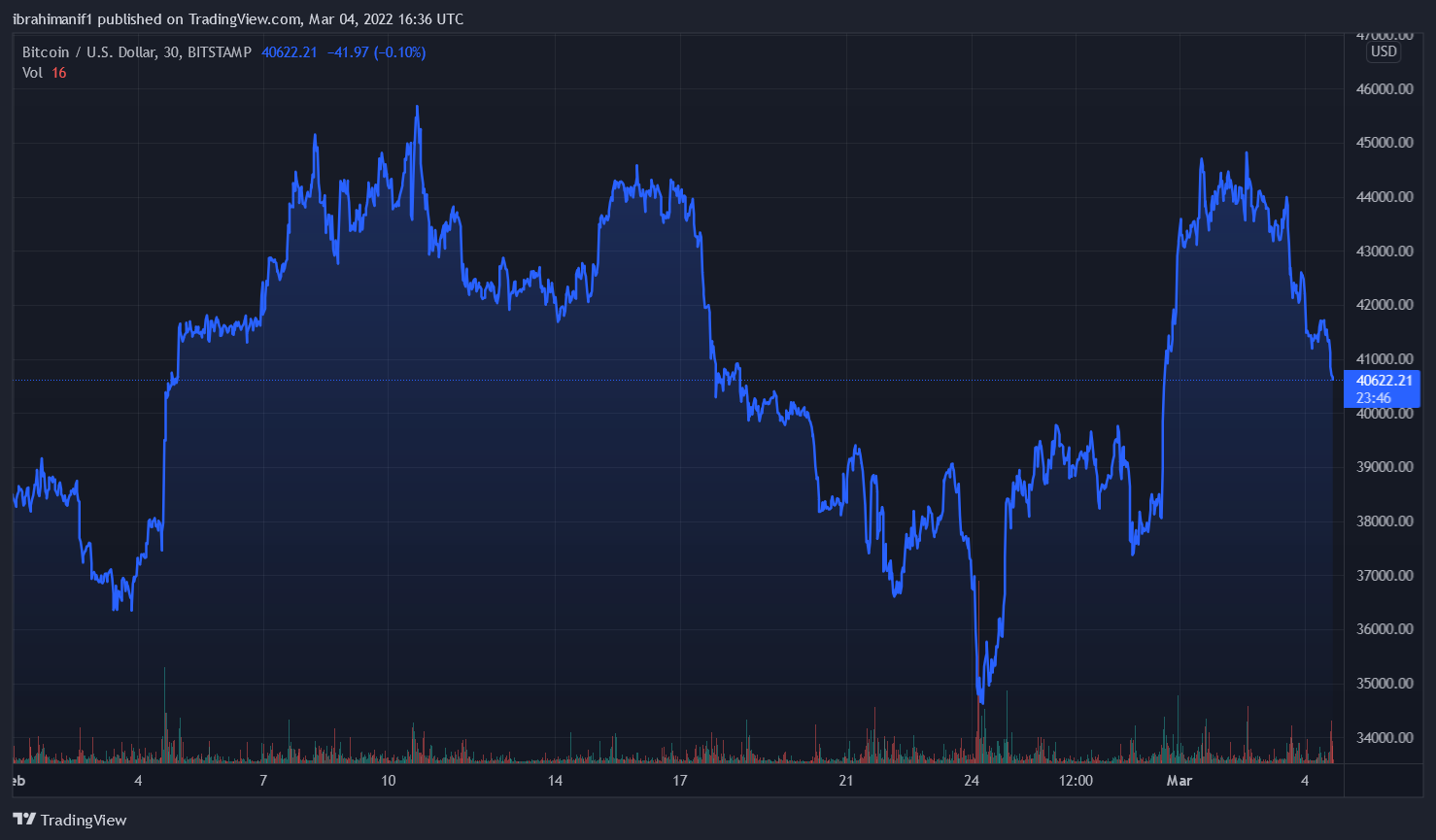
BTC/USD trades at $40k. Source: TradingView
The US Treasury Department announced on March 1st that sanctions on Russia will include checks on digital currency. Large crypto exchanges were also instructed by the White House to avoid doing business with sanctioned companies.
In an executive order, the government says it will take action against anyone who violates Russia’s sanctions, including through the usage of digital currencies.
During the Russian-Ukrainian war, many politicians, influential people, and government agencies like as the US Department of the Treasury have focused on spreading a narrative that paints crypto in a negative light, however several of their reasons have been proved to be false.
Crypto Is The True Money?
Having financial freedom for anyone is one of the primary objectives of cryptocurrency. Crypto is intended to be an unbiased instrument, free of the ties that bind governments and banks, and a weapon against oppression and dictatorship.
Is your money truly yours if it can be taken away from you by regimes and governments? This is why many people now believe bitcoin is the only true currency.
The basic notion of cryptocurrency is that it is money, but it is uncontrolled. The original cryptocurrency, Bitcoin, was established by honest libertarians who cherished their privacy and wanted to keep their money out of the hands of the government.
It’s true that cryptocurrencies have been used in the past to circumvent international sanctions. North Korea used ransomware operations to amass significant sums of bitcoin; the regime has converted an unknown quantity of money into usable currency, most likely in the tens of millions of dollars.
Tom Robinson, chief scientist and co-founder at the crypto analytics firm Elliptic said:
“Because there is no central controller who can impose their morals on its user, crypto can be used to crowdfund for the Ukrainian army or help Russia evade sanctions.”
“No one can really prevent it from being used in either way” he added.
A spokesperson for the world’s largest crypto exchange, Binance, told CNBC that crypto is “meant to provide greater financial freedom for people across the globe” and a blanket ban would “fly in the face of the reason why crypto exists”.
Kraken’s CEO, Jesse Powell, tweeted that the company “cannot freeze the accounts of our Russian clients without a legal requirement to do so.”
Because this libertarian principle of crypto, many have criticized crypto exchanges for continuing to facilitate crypto transactions for Russians. Hilary Clinton noted in a recent interview that she was disappointed in “so-called crypto exchanges.” She said:
“I would hope somebody at the Treasury Department is trying to figure out how to rein in the leaky valves in the crypto market that might allow Russia to escape the full weight of the sanctions.”
“Some philosophy of libertarianism or whatever,” she sneered.
Maybe what this demonstrates is that the inability to control crypto is a problem for a world order? Financial freedom and the unbiased nature of crypto are inherently problems for order and a world where a few can decide whose money to blanket ban. It establishes a sort of utilitarian society where the ownership or value of your money doesn’t depend on the misdeeds of your national government.
How Impactful Is Crypto?
However, it remains to be seen how much of an impact it will have on the conflict. While symbolic, bitcoin donations of a few hundred thousand dollars may not signify much to a Ukrainian army that got $650 million in weaponry from the US last year and is still significantly outmanned.
Last Monday, Vice President Joe Biden announced the delivery of $350 million in military aid to Ukraine. The EU responded with a $500 million commitment of military aid, an unprecedented gesture. In addition, the White House is requesting an additional $10 billion from Congress. Cryptocurrency transactions are a drop in the bucket.
And the hefty transaction fees of cryptocurrency are eating into what Ukraine receives. In the last week, the cost of a Bitcoin transaction has tripled. Gas fees on Ethereum, which trades a variety of coins, have been more consistent, although users have often grumbled about how pricey they are.
Related article | Iranian, Venezuelan OpenSea Users Blocked From NFT Platform Over Russia’s Attack On Ukraine
Featured image from Shutterstock, Chart from TradingView.com

You can get bonuses upto $100 FREE BONUS when you:
💰 Install these recommended apps:
💲 SocialGood - 100% Crypto Back on Everyday Shopping
💲 xPortal - The DeFi For The Next Billion
💲 CryptoTab Browser - Lightweight, fast, and ready to mine!
💰 Register on these recommended exchanges:
🟡 Binance🟡 Bitfinex🟡 Bitmart🟡 Bittrex🟡 Bitget
🟡 CoinEx🟡 Crypto.com🟡 Gate.io🟡 Huobi🟡 Kucoin.


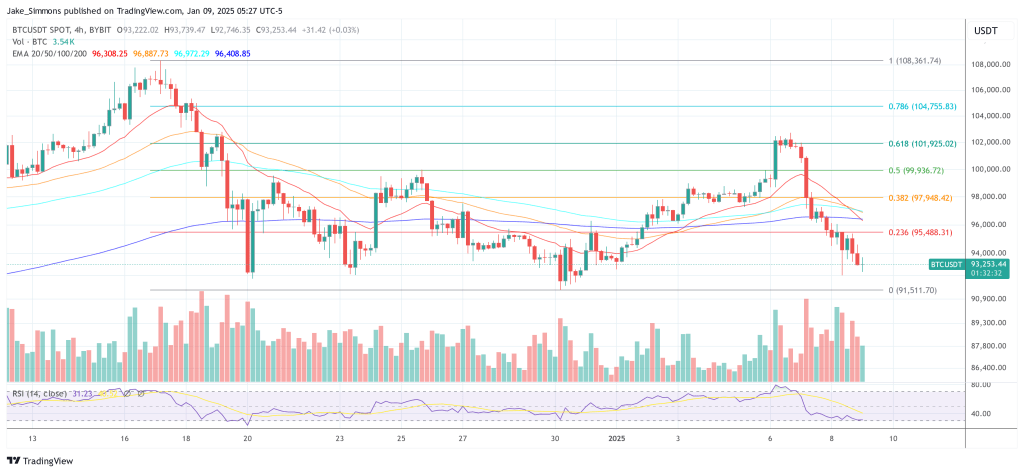


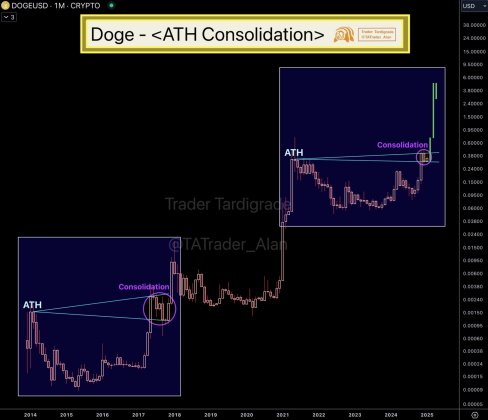
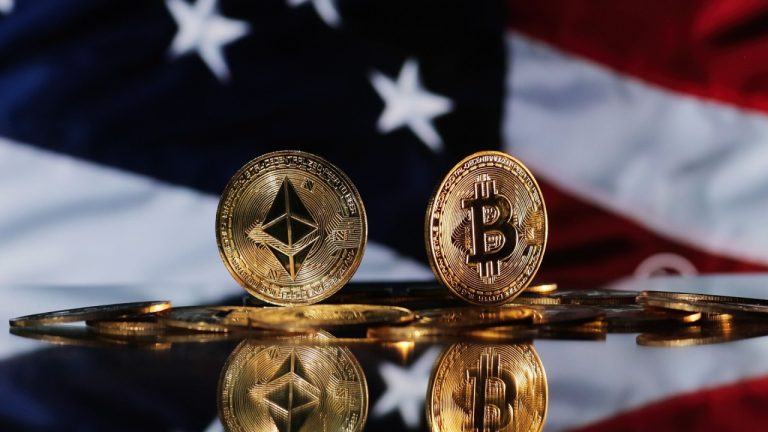


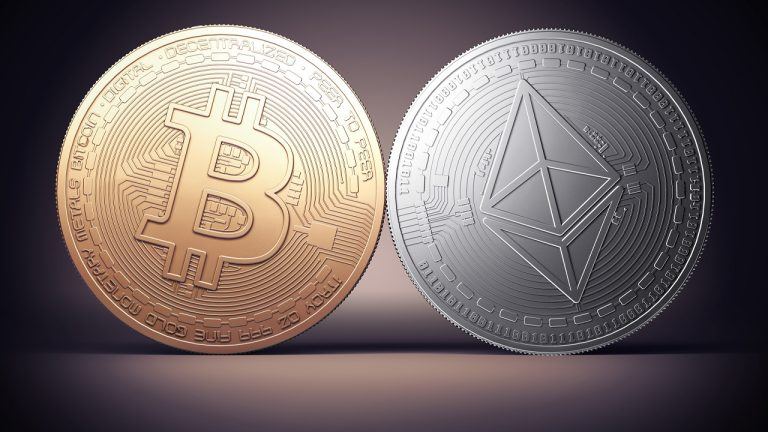



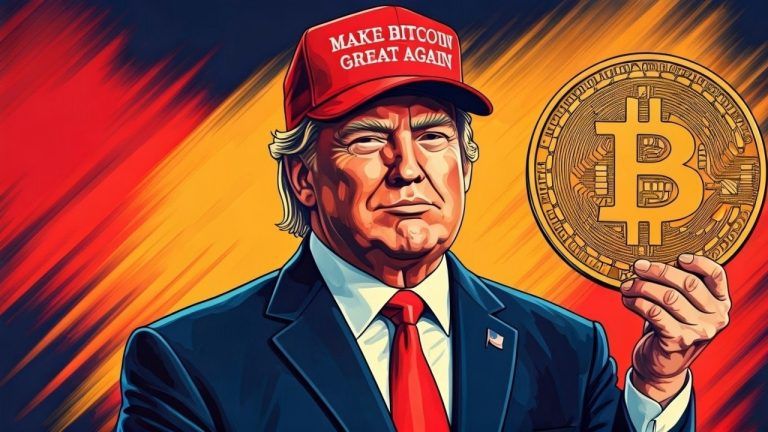
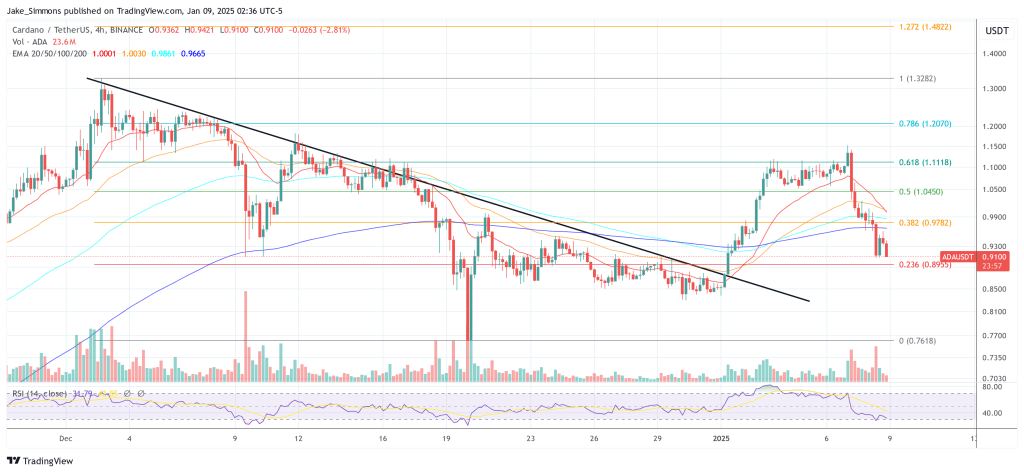
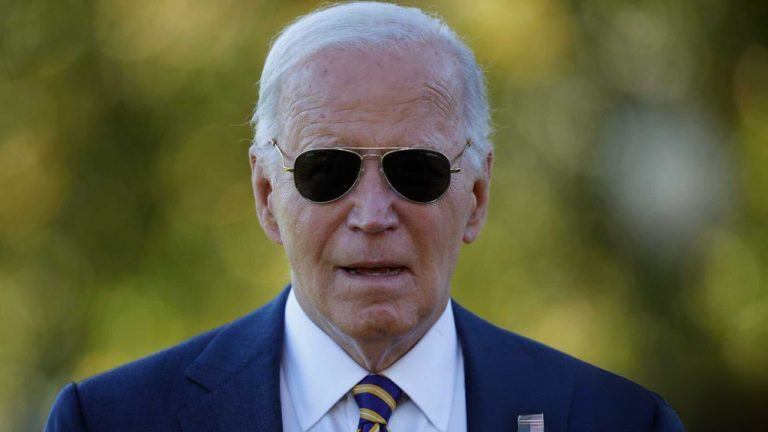
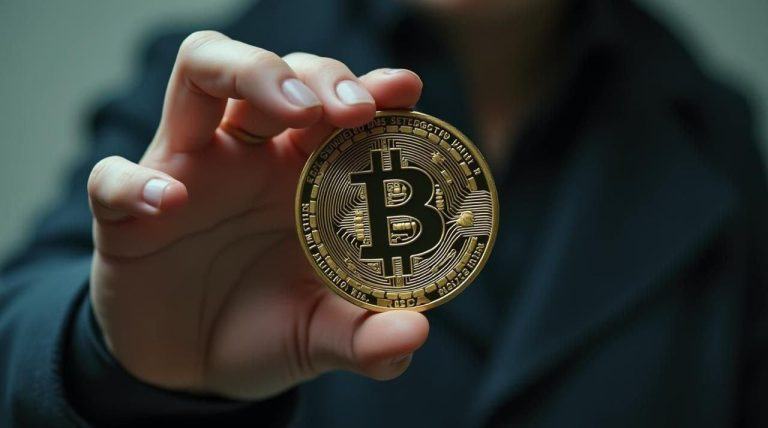
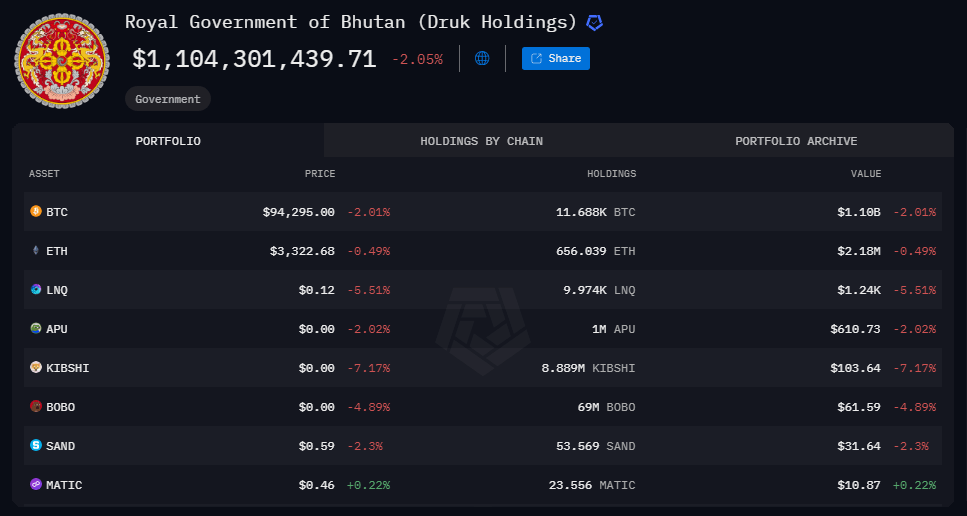

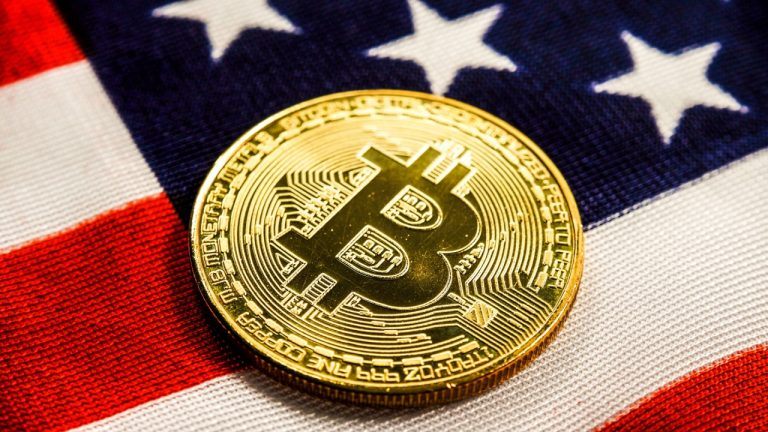
Comments